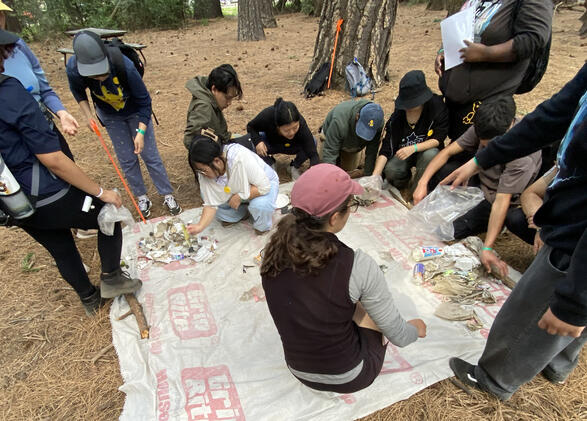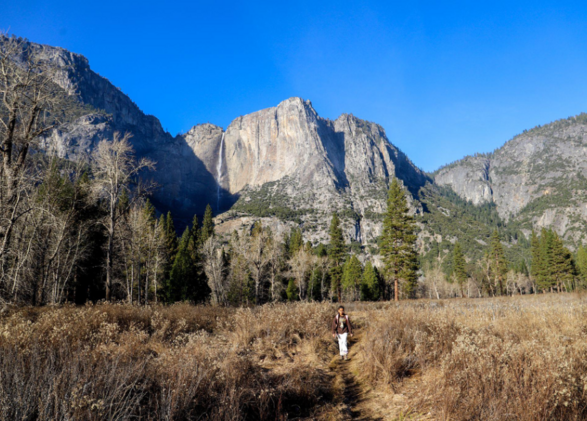Miho Aida: A Sustained Practitioner of inclusivity

When Miho Aida was born, her parents chose the character 民 (“mi”), which means “people,” as the first part of her name. As is custom in Japanese culture, her parents made a wish that was embedded in the characters of her name.
“In so doing, they wished that I’d become a kind person, a good listener and a trusted leader who would always be surrounded and protected by ‘the people’ and who would bring joy to ‘the people,’” explains Miho. “Inherent in this character is a reference to democracy, where all people’s voices are heard and valued.”
Anyone lucky enough to cross paths with Miho knows well that her parents’ wish came true. The impact that Miho and her work has had on people from every walk of life is tenfold. Each and every day she embodies what it means to be a sustained practitioner of inclusivity. She works to ensure that all people’s voices are heard; that all outdoor spaces are welcoming; that everyone not only has a place at the table, but has no barrier to come to the table and is encouraged to participate as a valued member of the community.
Anytime we talk about women in leadership at NatureBridge, so much of what we do is a result of Miho, her vision and her gentle pushing reminding us of the importance of this work.Autumn Saxton-Ross, NatureBridge Board Member
Miho has dedicated her life’s work to increasing visibility and access to environmental education, careers, public lands and outdoor adventure for those whom our system has failed to provide these opportunities. Miho’s journey with NatureBridge began in 2000 as an Environmental Science Educator at our Golden Gate National Recreation Area campus, on the traditional territory of Coast Miwok, Ohlone and Graton Rancheria. For more than 20 years, she has followed that calling as an educator at NatureBridge, working to foster a culture of inclusivity.
“What drives me to serve the world is summarized in 5Es: environment, education, empathy, equity and empowerment,” once said. “With NatureBridge and beyond, my life has been dedicated to increasing the resources and opportunities for people who had little, if any, access to our public land, environmental and outdoor education and its workforce.”

Miho’s top priority for her students is that they may develop social and emotional skills to connect with each other and to care for the Earth and that they feel empowered to make a difference in their community and environment. While she hopes for these big moments, it is the simple moments when young people share their joy from finding coyote scat, being mesmerized by the powerful waves and working together as a team to accomplish a challenge that bring her the most joy.
“When kids see themselves reflected in nature, love for what it is and understand that they are part of the ecosystem,” she said, that’s what brings her the most joy.
Miho’s work impacts a vision she has for the future, a vision that still has many barriers.
“Being in nature and having access to outdoor space is our basic human rights. That should be granted to everyone and yet that is not our reality yet. I envision that one day our system recognizes the rights to access to nature and the outdoor space and we are not separate from nature so that we change our societal structure for all people to have no barrier to get outside,” she said.
Miho has been integral in inspiring and furthering the organization’s work in Equity, Inclusion and Diversity (EI&D). In 2013, she took on leadership with the creation of the Equity and Inclusion Manager position in an effort to institutionalize NatureBridge’s diversity effort for our participants and employees.
“Two decades ago, I hardly ever saw someone like me doing outdoor sports or environmental work in the media,” said Miho. “I wanted all young women, particularly women of color to see role models who look, sound and live like them so that they know what outdoor adventures, careers and leadership opportunities are possible.”
With the support of the Matt Baxter Award in 2008, Miho was able to do just that: She traveled around the world, interviewing many inspirational outdoor women of color so that she could share their incredible stories with the world beyond NatureBridge.
In addition to her work at NatureBridge, Miho launched "If She Can Do It, You Can Too: Empowering Women Through Outdoor Role Models," a project dedicated to creating a culture that gives a voice to outdoor women of color who are making an environmental impact. This project is dedicated to creating a culture that gives a voice to outdoor women of color who are building and sustaining powerful social, environmental and human rights movements against the backdrop of the great outdoors. To learn more, visit her website.
Miho has consistently pushed us to expand our perception of what it means to be a more equitable organization. She models and lives her beliefs every day and inspires us to do the same.Meg Jakubowski, National Director of Education
“I felt that the contemporary narrative of their work has been missing when sharing stories of people in our public lands,” she said. “I was able to produce a short documentary that amplifies the voice of Arctic indigenous Gwich'in women who speak for the permanent protection of their sacred land - also known as the coastal plain of the Arctic National Wildlife Refuge in Alaska.”
You can watch the film here. Since 2014, Miho has taken this feature on bicycle film tours since 2014, riding over 3,000 miles across the country. She is a featured athlete among the 2019 world’s most adventurous women in Men’s Journal as well as the 2020 finalist of Rachel's Catalyst Award which celebrates women environmental leaders of color. Most recently, Miho is a featured “Genius” activist in the 2021 National Geographic Almanac.
The second award, the Bishop Marcus Award, gave Miho the opportunity to specifically focus on contributions of Native American women who have been taking care of our public lands.
She has used this film throughout her teaching and has often been invited to visit schools for the school-wide film viewing so that all kids can benefit from learning about current and ongoing struggles of Native American people and discover how young people can make a difference.
“Both journeys gave me tremendous opportunities to recognize my own privilege and personal power to create a change,” she said. “The experience and process through these awards put me on a path of struggle to attain liberation for all people. It is and it will be my duty and a way of life to take a personal, professional and societal responsibility to work for justice.”
Miho is currently working remotely from Tokyo and enjoying the opportunity to be closer to family and reconnect with her ancestral territory.
This Women’s History Month, and every month, we honor the leaders like Miho, advocating tirelessly for access and inclusivity for all.

